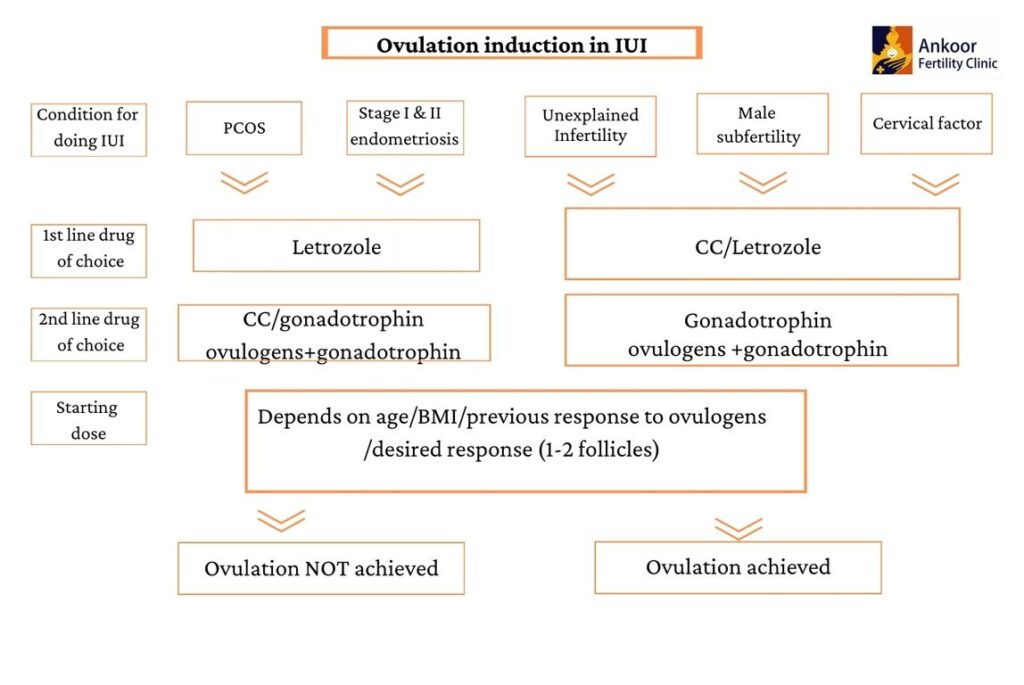IUI is one of the simplest artificial reproductive procedure in which semen is processed and good quality sperms are injected inside the woman’s womb around the time of egg release, thus reducing the distance usually needed to cover by the sperms in order reach the egg at the correct time.
Patients suffering with low sperm count, decreased sperm mobility, in patients with PCOS or other conditions where ovulation induction is required, unexplained infertility (inability to achieve pregnancy in spite of all normal tests), hostile cervical condition or ejaculatory dysfunction or erectile dysfunction or conditions making sexual intercourse difficult, can all benefit from an IUI procedure.
In cases where the husband is not around due to travelling or work, frozen semen can be used for IUI.
IUI is done with washed and processed semen. It is a technique that places prepared sperm directly into the uterus using a catheter. IUI bypasses the vagina and cervix (neck of the womb) where many sperm are otherwise lost, thus the number of motile sperm available to fertilize an egg is increased.
In a cycle in which decision for IUI is taken, the lady is checked via a vaginal ultrasound on day 2 or 3 of menses to rule out any cysts in ovaries and then started on medications to induce ovulation (natural cycle IUI can also be done depending on patient and their history). Ultrasound is repeated to monitor growth of egg and an injection to help ovulation is given once the egg reaches a sufficient size.
A speculum is used to separate the walls of vagina and using a sterile plastic cannula, processed semen sample is injected inside the womb.
The male partner is made to give semen sample on the day of IUI (frozen sample can also be used). Sample is then processed using techniques like swim up or density gradient and highly motile sperms are then separated and used for IUI.
An IUI procedure is performed around the time of ovulation. This is determined by doing serial ultrasounds on alternate days and depending on the time of ovulation trigger.
Usually IUI is performed 24-36 hours after ovulation trigger.
Most women consider IUI to be fairly painless, similar to having an internal vaginal examination. There can be some minimal cramping afterwards, but often what is felt is ovulation-related cramps or anxiety related discomfort rather than from the IUI.
Once sperm is injected into the uterus it doesn’t fall out. Sperm deposited in the uterine cavity move upwards towards the fallopian tube. Occasionally there is wetness after the IUI procedure but this is related to the remaining semen coming out.
Once the IUI procedure is done, you are made to lie down for 15-20 minutes after which you can continue with your routine activities. You may be given certain progesterone (pregnancy support) medication which needs to be taken (oral or vaginal or both) for the next 10-15 days. NO ADDITIONAL REST IS REQUIRED.
Implantation generally takes place 5-7 days after ovulation/your IUI procedure.
It is highly recommended that the patient wait two weeks before taking a pregnancy test; as Urine pregnancy test usually becomes positive after 14 days of conceiving.
Success rates will vary with the couple’s original diagnosis and the number of cycles of IUI. The pregnancy rate per cycle of insemination is 15-20%. Couples with problems related to male partners have a success rate of 10-15%. Success rate also depends on the age of female partners with an age of <30 years having success rate of 20-25%; 30-35 years- 15-20%, >35 years – <10% success rate.
It depends on the history and cause of infertility. If a couple doesn’t have success after three to four ovulatory cycles with well-timed IUI, it might be time to consider IVF.
NO special precautions are needed to be taken. One can go about their daily routines. This includes eating what one use to eat before IUI and exercising like one use to before IUI. Your doctor might prescribe you certain medications after IUI which you need to take regularly for supporting pregnancy for 10-15 days.
Yes, you can continue with your regular sexual activity after IUI. Infact it is preferred that one have sexual activity after IUI too so as to make the most of the time of ovulation.
You DO NOT need to rest after IUI. You can go about your daily routine after IUI. You can travel by all modes including trains, buses, 2 wheelers, etc.
You CAN eat everything that is healthy. Food that is a known to cause allergy to an individual can be avoided.
Yes you can travel on any kind of roads after IUI and can use any mode of transportation.
The pregnancy rate of IUI is around 15% as this procedure only brings the egg and sperm closer but does not actually meet them up and form the baby. As this is not facilitated in an IUI procedure (unlike an IVF procedure where a baby is directly put in the womb), the rate of pregnancy is lesser than IVF but definitely greater then a natural cycle.
No. The decision about the mode of delivery depends on various factors like the wellbeing of the mother and the baby in the womb. All decisions regarding pregnancy and delivery are taken after discussion with the to be parents.
